
|
 |

|
 |
An imaginary interview with Guru Gopinath - Part 12 - Tapati Chowdhurie e-mail: tapatichow@yahoo.co.in Photos courtesy: Sashimohan June 24, 2022 All parts of the interview The story so far Besides being a dancer, teacher and choreographer, Guru Gopinath was a prolific writer. He had trained innumerable dancers, both Indians and foreigners, many of whom have taken it up as their profession. Some of his students had risen to the pinnacle of glory. Dancers like Lalitha, Padmini and Ragini (the Travancore Sisters), Yamini Krishnamurthy, Padma Subrahmanyam, G.Venu and many others have taken dance lessons from him. He was proud to be invited to Ahmedabad to direct 'Chandala Bhiksuni' for which he was gifted with a gold plate by Sri Viswanathan. He was a dutiful and ever caring family man. The 12th part of the imaginary interview Guruji, please tell us about what happened after your program in Tashkent. The night after the Tashkent program we were given a grand dinner which lasted till 3am. We had a flight at 4am which unfortunately was delayed to 7am. I covered myself with my overcoat and dozed off in my chair only to be woken up to the sound of Thappu melam (musical instrument) accompanying the dance of two girls arranged to entertain us. Seeing me asleep, the dancers started singing and dancing loudly close to my ears to wake me up. Though I woke up, I sat like Vishwamitra with my eyes closed and hands locked. Even after I sat there for 25 minutes in that position, the two beauties continued dancing in front of me. It was something like the meeting between Vishwamitra and Menaka, where Vishwamitra was attracted to Menaka. Considering my age, the beauty of the dancers and the cold weather, I did not want to miss the opportunity of dancing with them. The airport employees and the people sitting there appreciated our dance and clapped to encourage us. We stopped dancing at 6.30am and called it a day. They said they liked dancing with me and I thanked them for it. At 7am, we wished them good cheer and boarded our flight. 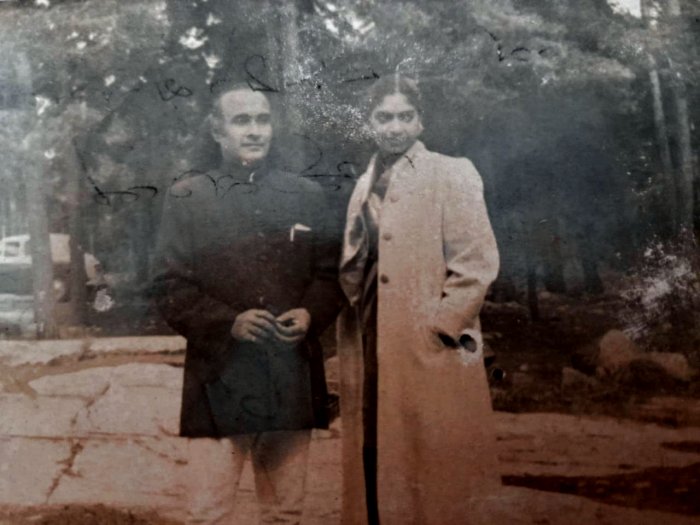 Guru Gopinath with Maya Rao Please tell us of your experience when you were invited to be the judge of the Classical Indian Dance Festival held at the 8th World Youth Festival in Helsinki. I accepted the invite, flew to Delhi and boarded my flight to Moscow by Air India. When the plane landed in Moscow, the host came to receive me and took me to a hotel. One of them took a cart to collect my luggage. They did not bring my belongings until midnight. I was told that my luggage had not arrived. Since my blanket was with my clothes in the luggage, I spent a sleepless night. During my last visit in 1954 the hotel had proper heating system. This time the hotel booked did not have that facility. The next day, I along with a member of the host group, took a 24 km drive to Moscow airport. We met one Mr. Rao, an Air India officer, and told him about my missing luggage. He immediately called the Delhi airport only to be told that the luggage was not in Delhi airport. He pledged to offer me 1000 Roubles for buying clothes and also enquired the previous day's flight about my missing luggage. He was told that they have a suitcase in their room. They sent someone to collect it and luckily, the luggage was mine. We thanked the officer and returned to the hotel. The next morning, we took a flight to Leningrad and reached around 11am. I had to travel 1.5 miles from there to catch the 2pm flight to Finland. I was clueless about the bus that would drop the passengers there. I also could not find any helper to carry my luggage. So with great difficulty, I started walking with the big heavy suitcase on my head, a bag on each shoulder with trousers, shoes, long coat and overcoat on. By the time I reached there, I was sweating profusely even more than I would after a stage performance. After unloading myself, I sat under a fan and removed the overcoat and tried to relax. I could take the flight to Finland on time. Once I reached Finland, the Youth Festival organizers took me to Helsinki in a car and dropped me at the 5th floor of a VIP hotel. The hotel room was very big. They also informed me that meals would be served in the room and they left. There were different types of hard drinks, cold drinks and fruits in the room. They served dinner at 8pm. I slept after having dinner. In the morning, they served bed coffee and breakfast. But there was no chance of exchanging a conversation with anyone, because everyone in the hotel spoke only Finnish or German. And I had no hold in those two languages. The stay in that hotel was like staying in a prison. I frantically wanted to talk to the Indian Youth leader Vasudevan Nair. I took the elevator down to the reception. I conveyed my message to the telephone operator in broken English and whatever little Russian I knew. Luckily, that lady knew a bit of English and I asked her to help me. She called the Yuva Janotsava Committee and got Vasudevan Nair on line for me. I told Vasudevan Nair about my stay in the big hotel which was like living in prison. So he came and rescued me from there. They were staying in a college dormitory with 17 small beds lined up. I took the 18th bed. There were Tamil, Bengali, Telugu, Hindi and Malayalam speaking people staying there. All the 18 of us stayed there happily. That was the first time I personally met K. Govindan Pillai, who later became the private secretary of the then Kerala Chief Minister, Achutha Menon. Staying with us were also Ramu Kaaryatt and M.T. Vasudevan Nair. As advised by Vasudevan Nair, I went to the Chinese Embassy and taught 'Rangapuja' to a Chinese dancer in 3 hours. While returning from there after having a Chinese meal, they presented me with some gifts. Among the gifts was a bottle of liquor. I took all that and returned and showed Vasudevan Nair and the others the gifts I had received. I asked them what I should do with the liquor bottle, to which Ramu Kaaryatt said, "You should just give it to us!" I did so! As soon as the festival was over, the music director S. D. Burman and I were sent in a guest flight via Moscow to India. To have gone to Helsinki as a VIP was an unforgettable memory. 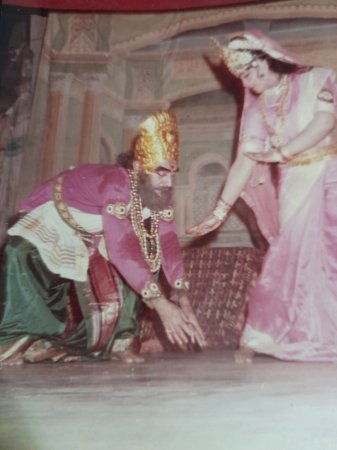 Guru Gopinath as Dasaratha, Saroja as Kaikeyi 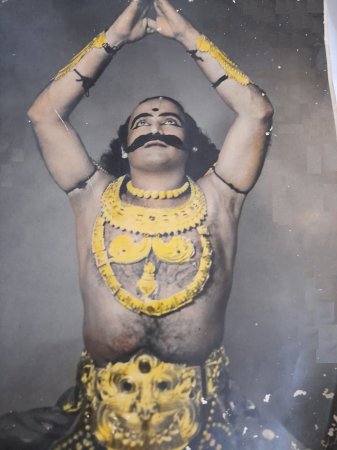 As Pururava What was the "unfulfilled wish" that you often spoke of? I had a wish to never have a criminal or civil case on my name in my life. It did not happen. Even though there were no criminal cases against me, I was involved in civil case 3 times. My elder brother Champakulam Pacchu Pillai used to cultivate 35 acres of land near my house in Kuttanad that I had bought with the money I earned during 1938-40. In 1970, my widowed sister wanted to buy that land and I agreed and took a good amount of advance money from her. But the moment my elder brother came to know about this, he said that the land cannot be sold and according to the existing law it belongs to him. Later, when my elder brother came to Thiruvananthapuram, I spoke to him about it, but he was adamant and did not budge from his previous decision regarding the land. I vowed that, "If there is even a drop of blood in my body, I would sell the land to my sister" and we left. After 2 weeks I got a notice from Alapuzha tribunal court. My elder brother had filed a case claiming that he was the leaseholder of the property. I went to Alapuzha and met the lawyer N Ramakrishna Pillai and told him my side of the story and submitted a reply to the notice. It's been 2 years, since any decision was made. After which I went directly to the Tribunal court according to the instructions of my lawyer and gave my statement. In that court, only the judge was seated on an elevated platform. The rest of the lawyers were seated on either side of the room. The plaintiff and the accused gave their statement standing. When I was giving my statement the judge said, "You may sit and give your statement, Guru Gopinath". I said respectfully that, since I am an accused in this case, I will give my statement standing. My elder brother's lawyer was Alapuzha Kalleli Raghavan Pillai's brother, who was my friend. Within 15 minutes time my statement was over. Meanwhile, the lawyer of the plaintiff asked me, "Haven't you leased the land to the plaintiff for years?" I replied that every three to four years my elder brother would write a letter to me furnishing me with the details of the cost of farming, the income, the amount of paddy given to my father, mother and sister at home; the cost of the paddy- Rs.1.5 per para (a measuring unit) and the amount donated to Padhipurakkal temple. A part of the money he owed me after all the expenses would be sent to me with the promise to settle the rest in future. "Can you produce that letter to the court?" asked the lawyer. "I cannot say for sure because I have changed residences many times. I have stayed in Thiruvananthapuram, Madras, Delhi, Ernakulam and now again I am back to Thiruvanathapuram. Besides I did not know that this letter had to be kept safely." For the first time, I had an experience of testifying in a court of law. My brother and I were a part of the 100 year celebrations of Chengannur Raman Pillai, where the case came to an end with the help of our well wishers who all knew about this case, like M.K.K. Nair, N.P. Chellappan Nair, Kalamandalam Chairman D.H. Namboodirppadu, D. Damodaran Potti. It was decided that my elder brother would pay me Rs 3000 for the 15 acres of land and the remaining 15 would go to my sister.  Guru Gopinath The second case was filed by Narayana Pillai, who lived near Nedumangad, claiming to be the heir to the family of the owner of the property I bought in Thiruvananthapuram in 1942. Advocate M.N. Parameshwaran Pillai was in charge of this case as he was appointed as my lawyer. Within 3 months, the Thiruvananthapuram munsiff court dismissed the case. The third case was in 1976 about surplus land. Advocate K. Shivashankar filed an appeal in the Ernakulam High Court against the order that I received to transfer 4 acre 83 cents of land received from the TVM (Thiruvananthapuram) land board to the government as surplus land. I did not have to appear in court for that case. Within six months, it was decided that I should hand over 2 acres and 30 cents to the Government. Will there be any more cases in my old age, who knows? 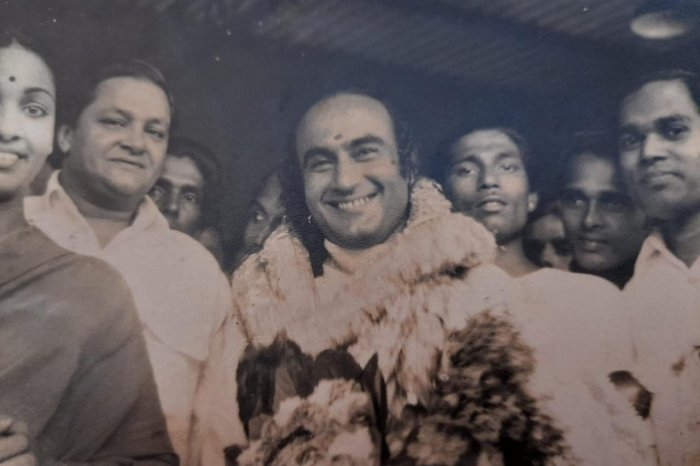 Guru Gopinath at a reception in Chennai You were speaking about thefts you were exposed to in the journey of life. Could you elucidate a little more? Twice during my travel from 1931 until now, my belongings were stolen. First was in 1948 in Calcutta, when along with my troupe members we were at Howrah station in Calcutta to go to Madras after the program in Tata Nagar. We came to know that the train was rescheduled to 7pm. Since we arrived in the morning, we had ample time. The troupe members stayed back at the station itself. Six large boxes for booking were carried to the front of the booking office. Realizing that the booking clerk would arrive only at 9am, I left the responsibility of booking and picking up the tickets to the manager and I left for Park Circus to meet A.R. Mukherjee who was an Assembly Secretary. While I was talking with Mukherjee, I received a phone message from the manager saying that one of the boxes was missing. Mukherjee and I went to see my editor friend, K.P. Thomas of Oriental Weekly and told him about the theft. He immediately called the Police Commissioner H.S. Ghosh Chaudhuri and arranged for a search of the missing luggage. Mukherjee and I reached Howrah station and met the inspector of police there and spoke to him. The inspector had already received a message from the commissioner. The inspector deployed 24 police officers for enquiry. My troupe members also joined them in the search and they checked the entire Howrah station until 12 noon in vain. We listed the contents of the missing luggage and wrote an application to the police. The inspector said that they would look for my luggage in Chor Bazaar and send it to us if they find it. Was there no one to look after the luggage, I asked. The manager said, "The girls were sitting in the waiting room. The rest of the men were going here and there and exploring the place. Thinking that it was in front of the booking office, I went for a tea break at 8.30am. At 9am when I came to book the tickets, I found the luggage that was kept on top missing." However we booked the remaining luggage and boarded the train to Madras. Mukherjee was with me till I left. The moment we reached Madras and opened our luggage, we realized that the expensive sarees and skirts were in the box that was stolen. In that were also the 3 Kanchipuram sarees that we took from Mylapore Radha Silks Emporium, on an agreement to buy it only if used or else we would return them. The sarees were worth Rs.3000. Other than that, skirts costing Rs.1000 were also there. After returning to Madras, I sent a detailed list of items that were stolen and made a new application to the Calcutta Police Commissioner and to the then Railway Minister in charge, Gopalaswamy Iyengar. They both replied that necessary actions will be taken. Six months later, they regretted that the items could not be traced. I had to pay Radha Silks the amount of Rs.3000. The second theft occurred on 13th July 1974 at the Madras Central station. I came to Madras from Thiruvananthapuram and after collecting the house rent, I took a second class ticket to Shornur to attend a meeting at Kalamandalam on the 14th. On the 13th evening at about 5pm, I kept my luggage and bedding in the Malabar Mail on my seat and was speaking to a friend artist K.V. Pillai for a few minutes. He left after 15 minutes. At around 5.30pm, when I checked for my belongings, I could not find them. Meanwhile, I saw some passengers coming and others coming and checking the reservation seat and getting off. Since the doors on both sides of the compartment were open, people kept getting in and out from both sides. Since I was facing in the front, I could not see the people getting in and going out from the back door. I started searching for my luggage in that compartment but in vain. Immediately I informed the Railway Police. At that time the local police inspector was a Malayalee from Kannur. His name was Narayanan. Immediately, he and two other police constables came with me and searched a few more compartments. We did not find my luggage. When the train was about to leave, he offered to give some money for expenses during my journey. Fortunately I had my ticket and Rs.30 for expenses and did not need to take any money. He asked me to write an application as soon as I reached Shornur and send it to him with the details of the stolen luggage and the approximate time of the theft. The train puffed off. I got down at Coimbatore station and sent a telegram to Gopalapuram Canara Bank, stating that no transactions should be there from my account. I reached Kalamandalam in the same clothes I was wearing and told everything to the secretary Induchoodan. I prepared the list and application before joining the meeting and sent it by post to Madras. I borrowed a shirt and dhoti from the Secretary and wore it. After the meeting, I came back to Thiruvanthapuram. In my stolen luggage was Rs.1500 and clothes worth Rs.300 along with my passbook etc. Three months later, I received a letter from the inspector that they could not trace my belongings. 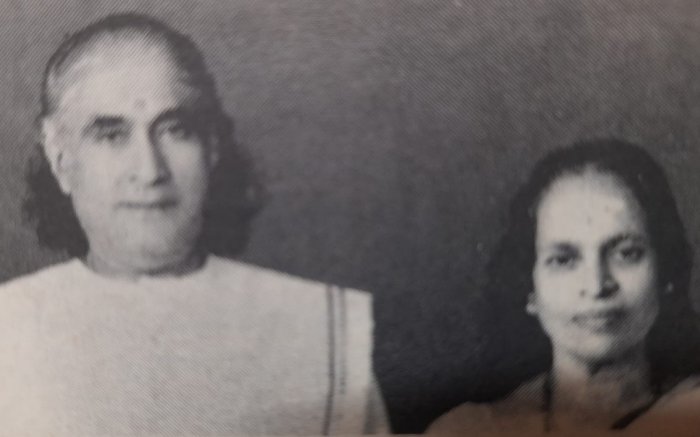 Guru Gopinath and Thangamani Similar thing had happened to Thangamani too. While performing at Rasika Ranjani Sabha Hall in Madras, I was getting ready to play the part of 'Taatha' in the Tamil dance drama 'Valliparinayam.' Thangamani had left 2 gold bangles weighing 4 sovereigns on the dressing table before entering the stage. After her performance, when she came back, she found them missing. She asked everyone present in the dressing room at that time, but everybody denied having seen it. Occasionally, people would come to the dressing room to supply soda and lemonade. We went home depressed. That night, Thangamani could not sleep. Even though we questioned some suspects, we could not figure out the culprit. The second theft was in 1975. Thangamani had gone to collect the house rent from Madras. She collected Rs.1500, kept it in a small metal box and took the train to Thiruvananthapuram from Egmore station. After boarding the train, she found her co-passenger, who was in her early twenties, seated opposite to her. The girl was accompanied by a couple of shady young men. Though she did not get good vibes from her, Thangamani struck up conversation with her, because she said she was also from Thiruvananthapuram. The girl said that she was the daughter of the Garden Superintendent of Vellayani Agricultural College. When the train reached Dindukkal station, Thangamani took out a Rs.10 note from a talcum powder box from her handbag and requested the girl to buy her a cold drink. Her Sharapoli mala of gold, weighing 5.5 sovereigns gifted to her by the Maharani on the occasion of Thirumadambu ceremony, was also in the same box. The girl was watching all this. She bought the cold drink for Thangamani and handed over the balance money to her. Thangamani spent the night tossing and turning in her berth using her handbag as a pillow. Sleep eluded her. Next morning, when the train left Kadakkavoor station, Thangamani kept her handbag on her seat and went to the washroom. Within minutes she was back to her seat. When the train stopped at Kazhakoottam, the girl alighted, supposedly to meet her relatives. After Thangamani reached Thiruvananthapuram, she unpacked her clothes and the rent (Rs 1500) she had collected and looked for the powder box that had the gold necklace with the balance money. She looked high and low for it, but the lost treasure was not to be found. "Aiyoooo," she screamed, "I cannot find the box where I had kept my necklace." Her thoughts went to the girl, her co-passenger. Immediately, I drove with her to Kazhakoottam to look for her. We searched the station, but did not find her. So we went directly to the Agricultural College at Vellayani where we came to know that the garden superintendent had two sons but no daughter. We then returned to the Railway Police station and gave a written statement to the police. They said that tracing the culprit without a proper address would be a herculean task. We were left with no alternative but to return home. After this incident, Thangamani lost all interest in gold jewellery. I also learnt a lesson that in a journey we should not carry valuables we don't need. To be continued...  Tapati Chowdhurie trained under Guru Gopinath in Madras and was briefly with International Centre for Kathakali in New Delhi. Presently, she is a freelance writer on the performing arts. Post your comments Please provide your name and email id when you use the Anonymous / blog profiles to post a comment. All appropriate comments posted with name and email id in the blog will be featured in the site. |